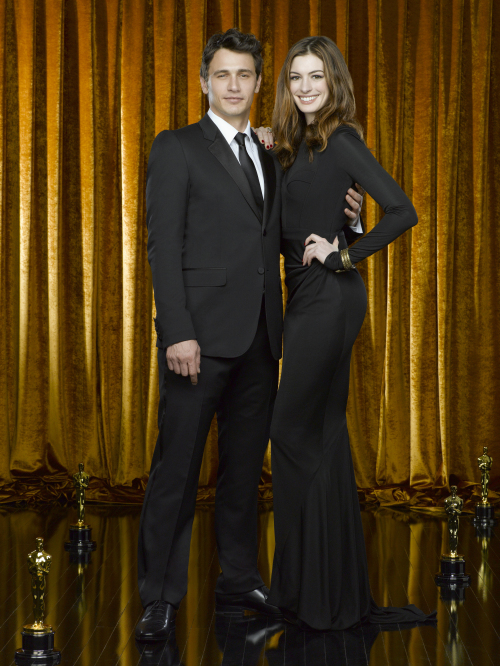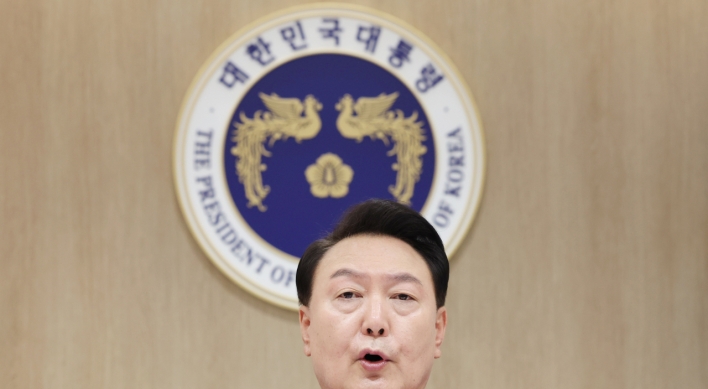Will James Franco pull a poem out of his tux, or read an excerpt from one of his short stories?
Will Anne Hathaway break into song?
Will the two of them, virgin co-hosts of the 83rd Academy Awards, dazzle the Kodak Theatre crowd Sunday night ― and more important, dazzle the millions of viewers around the globe?
Or will the untested duo drown in a pool of commingled flop sweat?
Franco, 32, and Hathaway, 28, are joining a small club of men and women who have hosted the Academy Awards ceremony since its inception in 1929, when the first Oscar ceremony ― untelevised, obviously, but also un-radioized ― took place at the Hollywood Roosevelt Hotel.
Douglas Fairbanks and William C. deMille worked the room that night. Lionel Barrymore, Will Rogers and director Frank Capra were among those who took turns in those early years. And in 1940, the ski-nosed comic actor Bob Hope hosted for the first time (“Gone With the Wind” won best picture).
Hope, of course, went on to front 17 more Oscarfests, ending his marathon run in 1978 (“Annie Hall” took home the best picture prize). His signature shtick was to bemoan the academy’s complete lack of recognition when it came to his own screen performances.
Will Anne Hathaway break into song?
Will the two of them, virgin co-hosts of the 83rd Academy Awards, dazzle the Kodak Theatre crowd Sunday night ― and more important, dazzle the millions of viewers around the globe?
Or will the untested duo drown in a pool of commingled flop sweat?
Franco, 32, and Hathaway, 28, are joining a small club of men and women who have hosted the Academy Awards ceremony since its inception in 1929, when the first Oscar ceremony ― untelevised, obviously, but also un-radioized ― took place at the Hollywood Roosevelt Hotel.
Douglas Fairbanks and William C. deMille worked the room that night. Lionel Barrymore, Will Rogers and director Frank Capra were among those who took turns in those early years. And in 1940, the ski-nosed comic actor Bob Hope hosted for the first time (“Gone With the Wind” won best picture).
Hope, of course, went on to front 17 more Oscarfests, ending his marathon run in 1978 (“Annie Hall” took home the best picture prize). His signature shtick was to bemoan the academy’s complete lack of recognition when it came to his own screen performances.

“Welcome to the Academy Awards, or as it’s known at my house, Passover!” Hope quipped at the opening of the 1969 show.
“Hosting the Oscars is a very difficult job, because everybody sees you,” says Gil Cates, who produced a record 14 Academy Award telecasts ― and handpicked Billy Crystal, Whoopi Goldberg, David Letterman, Steve Martin, Chris Rock and Jon Stewart to preside over those Hollywood lovefests. “It’s not like making a lousy movie, where it just dies. Not only do your colleagues see you, but the agents, the elevator man in your building, the guy who parks your car ― everyone sees you.
“If you’re the host, you can’t escape that scrutiny, and you need a really strong constitution to do it.”
And because of that, Cates says, he has found that standup comedians ― folks who have spent years in the field, dodging rotten fruit, overcoming assorted humiliations, thinking fast on their feet ― are the breed best suited. “They are used to the unexpected, they’re used to carrying the weight of a show on their shoulders, and they really know how to play a room. ... They feel comfortable in that job.”
Johnny Carson, who hosted five times in the late 1970s and early 1980s, demonstrated particular cool. “His timing was so impeccable, and he was a Hollywood insider, and yet he was a man of the people, too,” says Mary Murphy, a senior lecturer at University of Southern California’s Annenberg School of Journalism.
Billy Crystal, an eight-timer, had his share of inspired moments, in addition to introducing, and inserting himself into, the best-picture parody clips.
Not that there haven’t been successful hosts who weren’t professional joke-slingers. David Niven, the dapper British actor (and Oscar winner, in 1958, for “Separate Tables”), proved his mettle in 1974 when ― as he was about to introduce the presenter for the best-picture prize at the 46th Academy Awards ― a stark-naked guy trotted across the stage.
Missing barely a beat, Niven responded to the streaker by noting to the audience, “Isn’t it fascinating to think that probably the only laugh that man will ever get in his life is by stripping off and showing his shortcomings?”
But there have been hosts who have died out there, too. Jerry Lewis, co-hosting the 31st Oscars in 1959, found himself in the unexpected position of having too much time on his hands. Thanks to overzealous scheduling by producer Jerry Wald, the show came up almost 20 minutes short. The rubber-faced comic started ad-libbing, pulling celebs out of the seats, taking a baton to the orchestra, and even tooting on a trumpet. The network eventually gave the comedian the proverbial heave-ho, finishing the evening with a rerun of a sports show.
And politics can sour the mood, too. When Marlon Brando dispatched Sacheen Littlefeather, an Apache, to speak about American Indian rights on his behalf when he won the best-actor Oscar in 1973, many, including that year’s co-host Charlton Heston, found the move unfitting.
Heston (whose late arrival that night forced Clint Eastwood to read Heston’s jokes from the cue cards) described the absent-Brando stunt as childish.
“The American Indian needs better friends than that,” he observed, post-telecast.
USC’s Murphy, also a contributor to Entertainment Tonight, notes that “every Oscar host I’ve ever interviewed has said it is just the most nerve-racking job that they have ever had. It takes months and months of preparation ... and even for the best people on TV, it is a really hard gig. ...”
And it helps to be an industry insider, she says. Neither Letterman nor Stewart went down especially well with the betuxed and begowned A-listers when the New York-based (and New York-acerbic) talk-show guys made their respective bows on the Oscar stage.
“Some of the edgier hosts, like Jon Stewart or David Letterman, did not get well-received by people in the room,” says Matt McDaniel, managing editor of Yahoo Movies. “Even though I personally, as a viewer, really enjoyed both of them, it seemed like they were playing to hostile crowds sometimes, because they didn’t seem deferential.”
That shouldn’t be a problem for Franco ― nominated, by the way, for best actor for his role in “127 Hours” ― or for Hathaway. After all, they’re working actors, and they’d like to work again. Dissing the big-time producers and directors in the audience isn’t going to help.
But then again, they might be able to get away with stuff that Letterman and Stewart could not.
“By having actors ― movie stars, really ― in the roles of host, the crowd might be a little more forgiving,” says McDaniel. “Because, if they poke fun at the Oscars, they are insiders. They’re part of the community.”
By Steven Rea
(The Philadelphia Inquirer)
(McClatchy-Tribune Information Services)


















